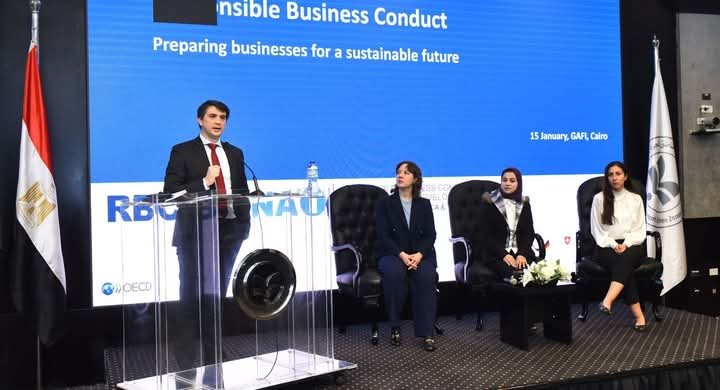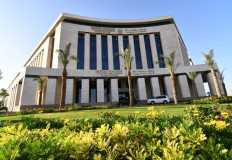
The General Authority for Investment and Free Zones, the secretariat and chair of the Egyptian National Contact Point for Responsible Business Conduct, hosted an event titled "Responsible Business Conduct in Egypt: Towards a Sustainable Future" in cooperation with the Organization for Economic Cooperation and Development (OECD).
The General Authority for Investment and Free Zones, the secretariat and chair of the Egyptian National Contact Point for Responsible Business Conduct, hosted an event titled "Responsible Business Conduct in Egypt: Towards a Sustainable Future" in cooperation with the Organization for Economic Cooperation and Development (OECD).
The event witnessed the launch of
the Arabic version of the OECD Guidelines for Multinational Enterprises and was
attended by Minister of Investment and International Cooperation, Engineer
Hassan Al-Khatib, and other leaders and experts, including Dr. Mahmoud
Mohieldin, the UN Special Envoy on Financing the 2030 Sustainable Development
Agenda, and Alan Lerberg Jorgensen, Head of the OECD Centre for Responsible
Business Conduct.
National Contact Points,
numbering 52 worldwide, coordinate efforts among government agencies to achieve
sustainability requirements, promote the OECD Guidelines for Multinational
Enterprises, and raise awareness and build capacity among companies to follow
procedures and recommendations through ongoing dialogue with all stakeholders.
The event underscored Egypt's
dedication to fostering sustainable and responsible business practices. Key
panel discussions explored the pivotal role of responsible business conduct in ensuring
the sustainability of business success, enhancing competitiveness, achieving
sustainable development, and sustainable value chains.
Engineer Hassan Al-Khatib
highlighted the Egyptian government's commitment to aligning Egypt's Vision
2030 with the UN Sustainable Development Goals, emphasizing their close link to
responsible business practices.
Dr. Mohamed Farid Saleh, Chairman
of the Financial Regulatory Authority, stressed the authority's focus on driving
sustainability within the non-banking financial sector, particularly by
enhancing companies' capacity for social responsibility disclosures.
Dr. Mahmoud Mohieldin, the UN
Special Envoy on Financing the 2030 Sustainable Development Agenda, underscored
that responsible business conduct is no longer optional but crucial for the
success and long-term sustainability of companies.
Hussam Heiba noted that Egypt was
the first Arab and African country to sign the OECD Declaration on Investment
in 2007 and to establish a National Contact Point to raise awareness and
promote responsible business conduct and sustainable business practices. The
General Authority for Investment remains dedicated to attracting investments
that drive sustainable economic growth. Recognizing this, the Investment Law
prioritizes creating a supportive environment that encourages companies to
embrace responsible, sustainable, and ethical practices throughout their
operations. This commitment aligns with Egypt's broader goal of achieving balanced
and sustainable economic and social development.
Alan Lerberg Jorgensen, Head of the OECD Centre for Responsible Business Conduct, commended Egypt's strides in integrating responsible business conduct into its policies. This includes implementing mandatory ESG reporting for listed companies and developing a draft corporate social responsibility strategy. Jorgensen emphasized that numerous new sustainability regulations worldwide draw inspiration from the OECD Guidelines for Multinational Enterprises. Therefore, aligning with these guidelines is crucial for Egypt to enhance its sustainability performance and bolster its global competitiveness.
The Guidelines for Multinational Enterprises include recommendations in the areas of human rights, labor rights, the environment, disclosure, anti-corruption and bribery, consumer interests, science and technology, protection of competition and the tax system, and were updated in 2023 to include updated recommendations in key areas such as climate change, biodiversity, technology, business integrity, and supply chain due diligence, as well as updated implementation procedures for National Contact Points for Responsible Business Conduct.





